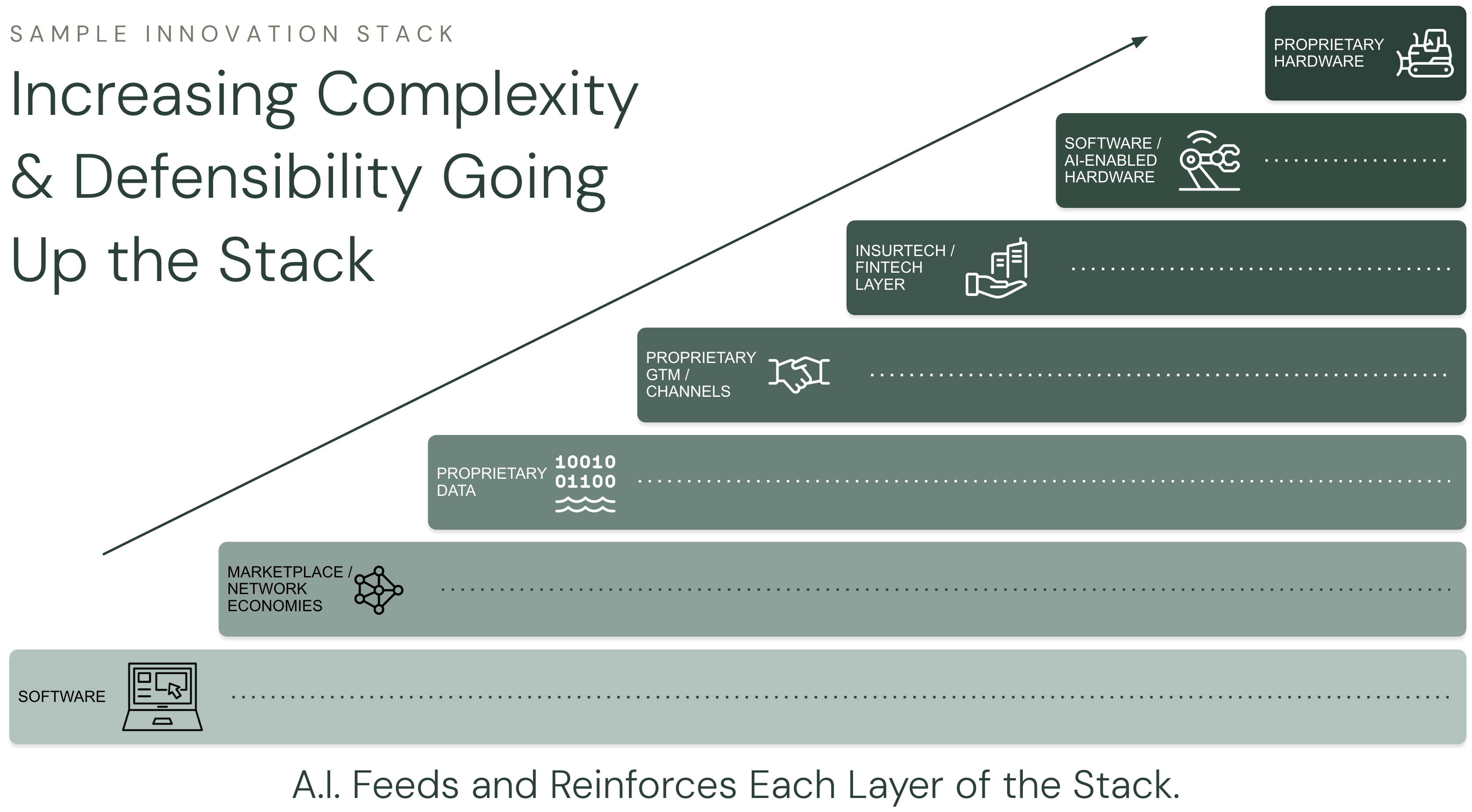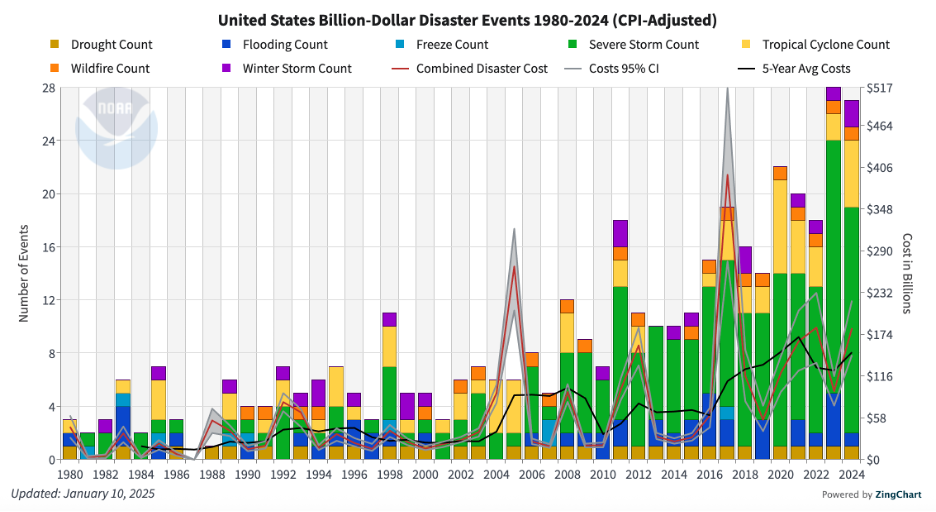AI x Climate Part 1: Introducing the Climate AI Startup
By
Virta Ventures
ON
May 14, 2024

Introducing Virta Ventures’ AI x Climate series, a multi-part deep-dive into the intersection between AI development and the climate space. Over the next few weeks, we’ll cover what constitutes a Climate AI startup, AI-driven opportunities and challenges in the climate space, strategic considerations for companies building at this crucial intersection, and more. Subscribe to our Substack to follow along!
The rapid progress of AI is undeniable. According to Bloomberg, generative AI is projected to become a $1.3 trillion market by 2032. If you’ve been wowed by AI products like OpenAI’s ChatGPT, this is hardly a surprising insight.
Promising applications of AI technology can be found in all industries and sectors. At Virta Ventures, we are laser-focused on equity-light climate tech solutions and are particularly excited about AI’s power in transforming the climate tech space. We recognize that AI isn’t a panacea for climate change, but we believe it has a big role to play in enabling technologies addressing the climate challenge. The opportunities are endless for AI to support the climate fight, from mitigation to adaptation and resilience.
We look forward to seeing how AI can both enable existing equity-light climate businesses to deliver outsized value to customers and also unlock the creation of groundbreaking Climate AI startups. These companies have crucial roles to play in solving existing climate challenges while also addressing new challenges brought by the growth of AI. At Virta, we seek to invest in great entrepreneurs that are solving real customer pain points through AI, supporting founders building both Climate AI startups and AI-enabled solutions.
But first, what is a Climate AI startup?
We define Climate AI startups as tech startups building innovative products that solve climate change that feature one of the following:
Proprietary Datasets
Climate AI startups that are able to build rich, domain-specific proprietary datasets build their moats through data. They’re able to build on top of more established AI models and avoid high development costs while providing unique insights.
It’s important to note that proprietary data access is one of the main value drivers for companies today. A Climate AI startup that is early and nimble in its development can build software to capture uniquely valuable domain-specific data that can drive improvements to its models, improving its ability to solve customer pain points and deliver value to customers over time.
We’ll highlight a Climate AI startup leveraging proprietary datasets: one of Virta’s investments still in stealth, an AI co-pilot for construction tackling the $1.6T productivity gap in the construction value chain. This company ingests structured and unstructured customer data, then organizes and analyzes that data alongside their own proprietary datasets to provide insights and workflow automation to dramatically reduce project delays caused by material and supply chain issues, reducing waste and saving time and money.
Proprietary Systems / Algorithms
Climate AI startups can also build unparalleled advantages by layering proprietary systems / algorithms on top of core AI technology to build out singular workstreams for a variety of real world applications.
This can look like the following:
- Layering diverse AI / ML tech and building out innovative logic that defines how data is processed in a multi-stage AI pipeline
- Combining non-proprietary data in non-obvious proprietary ways, complex prompt engineering
- Optimizing the RAG process by doing data & process refinement on non-proprietary datasets being retrieved
An example of these “layers” of AI and proprietary systems / algorithms in action: Precip, an AI-powered tool offering high-precision rainfall analytics for a variety of use cases. Precip processes raw data on precipitation through a series of models, building what they call “a proprietary ensemble of the various model outputs to deliver the highest quality blend of low latency and highly refined data.” Precip’s analytics can serve use cases in issuing fire insurance, preventing wildfires, optimizing agricultural yields, and more.
Several Virta portfolio companies focus on building proprietary layers on top of third-party foundational models as an AI strategy. Sunthetics, for instance, leverages algorithms to combine traditional AI / ML prediction with physical insights and chemical engineering concepts to help companies develop new chemicals, materials, and processes up to 32X faster and far more sustainably, while reducing development waste. Tyba, a SaaS company providing an unified and accessible modeling platform for energy storage developers / operators, combines best-in-class AI models within industry specific data-sets and proprietary algorithms to maximize the value of energy storage assets.
Vertical-Specific AI Models
While the cost of developing the most advanced foundational AI models is expected to increase over the coming years, there are many use cases where state-of-the-art models are not required and somewhat less powerful models can be employed. The development costs of those somewhat less powerful models has already decreased in recent years, democratizing AI model development for specific use cases. This has led to an increase in vertical-specific AI models (examples in healthcare, for instance, include Diffuse Bio for protein discovery and Piramidal for brain modeling).
We expect to see climate-specific AI models crop up in the coming years – either as full-stack solutions or foundational models to power third-party applications.
AI-Powered Robotics
Although not in Virta’s primary focus area, we’ll note that AI-powered robotics companies can play major roles in helping us solve our climate crisis. We’ve already seen numerous robotics use cases across climate tech — from solar panel cleaning to farming automation. AI advances can dramatically increase the efficacy and efficiency of such solutions. At Virta, we’ve invested in a cutting-edge all-electric construction equipment company (still in stealth) that will leverage AI to operate their machines and collect actionable data from construction sites.
Building an AI-Enabled Climate Startup
Even if not a Climate AI startup, climate startups can leverage AI to dramatically enhance their products / services and build their businesses faster and more efficiently. Climate startups can utilize underlying AI models to build AI-centric products and services – for instance, employing IBM’s geospatial foundation model to make reforestation solutions smarter and more precise. Climate startups can also harness AI tools to give operators “superpowers” to increase speed of innovation (think Github Copilot for SWEs). All companies should deeply embed AI into their operations, even if they are not building a moat around a novel AI technology.
At Virta, our portfolio companies leverage AI to make their operations more efficient and drive increased value to their customers. Treehouse, for instance, uses AI to provide instant quotes and automate permitting for a variety of home electrification products. Fractal, a financial platform providing farmland investment products that align farmer and investor interests, uses AI to automate comparables analysis during its underwriting process. And, sustainable commuter benefits platform Fleet uses AI to identify relevant commuter subsidies and benefits to maximize employee savings and enable climate-friendly commutes.
Whether they are building AI-enabled solutions or building fundamental AI moats, climate entrepreneurs can leverage AI in countless ways to solve customer pain points and build their companies more efficiently. At Virta, we’re fired up about the rapid pace of AI innovation and the potential impact on our climate fight.
Subscribe to our Substack to keep up with future insights in our AI x Climate series. To get in touch, connect with us here.
insights
We regularly publish thought pieces where we share lessons from renowned investors and delve into strategies for investing in the transformation of vital physical industries.







